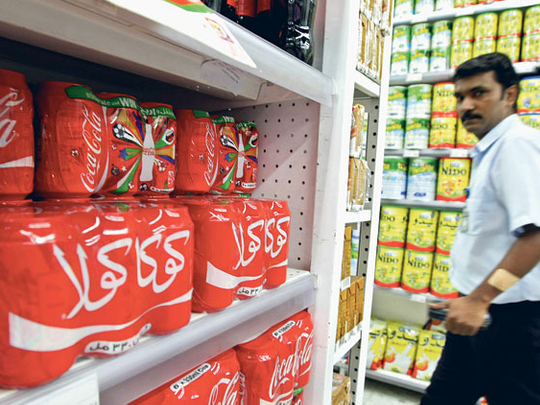
Dubai: Arabic words are no longer an obstacle preventing a brand going global, said Jae Hwang, Executive Director of FutureBrand, a global branding consulting firm.
The region's efforts to stay deeply connected with its culture have definitely had an impact on the brand naming process, he said. "In the early days there was this notion that Arabic words won't translate globally and that people will reject them," he said. "I think if that was ever true, it's no longer valid.
"When we look at the evolution of how branding, naming and design have evolved over the past few years, there are a couple of stages. At first it was just an incorporation of what was outside into the local market and using the transliterations," he said, such as Virgin, Coca Cola and FedEx.
"However, now and from an authenticity level, and the fact that the general public speaks Arabic, it makes sense to come up with a more Arabic name."
Limitations
But in a world where English is still the dominant language, there are certain limitations. "Whatever name you're going to do, you're going to try and find a name that is easily pronounced," he said. "It's not the meaning as much as the pronouncability of it."
"I bet you that 90 per cent of the non-Arabic speakers don't know what the word Al Jazeera means in Arabic," he said, "It doesn't matter, as long as people can pronounce Al Jazeera easily."
There has been a trend of Arabicisation in the past couple of years, said William Shintani, Executive Director and Head of Operations at FutureBrand. "It's really good for the region to grasp their authentic roots from the get go. People ask, ‘Should we have an Arabic name?' Well, it's not a straightforward answer. It's really a case-by-case situation."
Although there is a desire in today's time for a lot of companies in the region to reconnect with their cultural heritage and adopt names that are Arabic inspired, Arabic has its challenges.
English allows one to combine and make up words. "However in Arabic is harder to coin words. That's the uniqueness of the English language. You can't do acronyms as easily as English allows, as far as I know," Hwang said.
David Learman, managing director of Creative Intelligence, a strategic brand consultant company, told Gulf News that the majority of company clients that ask for the development of an Arabic name are usually government and semi-government departments.
"They by nature have to defend the nature of the UAE and obviously they have to defend the Arabic language and culture," he said. "But for example, most of the guests who come into the hospitality sector are from Europe, hence most hospitality organisations use English as their predominant language."
"The biggest challenge is to carry the meaning that is inherent in the word into another language," Learman said. He said that he prefers to use phonetics rather than to translate words because they tend to lose their sense and flavour. "The challenge is to keep the meaning."
Among other challenges is that Arabic words can have different meanings in different Arab countries because of the different dialects, Learman explained. "But there are some fantastic Arabic names such as Jumeirah, Beiti and Emirates," he said.
Asian market
However, over the last two or three years, the cutting edge branding has seen an increase in the Asian market, according to Learman. He said that the UAE is aligning its trade with these countries like China, Japan and Korea and so there is a lot of work with Chinese names to try and make them appeal to the Arabic audience and vice versa.
One example of an Arabic brand is Al Qasba, a tourist destination in Sharjah whose name was changed from Qanat Al Qasba recently. "We wanted to cut it short for simplicity reasons. It's shorter and can be easily memorised for both English and Arabic speakers," Hazen Sawaf, sales and marketing director at Al Qasba Development Authority, told Gulf News. "This area in Sharjah is called Qasba so we wanted to give it more emphasis through the name."
Sawaf said that he doesn't believe the brand, whether named in English or Arabic, would make a difference as long as the it goes hand in hand with quality of product and service.
"Everything works as long as you know what you want, as long as you live to it," he said. "I would encourage any Arabic company to push Arabic in their communication. Arabic language is very rich.
"For the past six or seven years, people have been asking for different fonts for the Arabic type," said Pascal Zoghbi. "There was a big demand and because the Gulf was opening up, it opened doors for the creation of new Arabic fonts."
The 29-year-old Leban-ese, who works as an Arabic type designer, is one of only seven qualified Arabic type designers in the world.
Today he is the founder of 29letters, an Arabic type design and typography firm in Beirut, which is named in reference to the 29 letters of the Arabic alphabet.
Standing out
Zoghbi told Gulf News that when new organisations and firms start up, they look for ways to stand out.
They are doing so through new Arabic type designs and logos for their brands, he said.
His design work includes creating new Arabic fonts, corporate identities and print publications.
He has created contemporary Arabic fonts for leading Middle Eastern newspapers such as Emarat Al Youm, Al Watan and Al Rouiah and for projects such as Ibn Battuta Mall, Madinat Jumeirah and Abu Dhabi Airport Terminal 3.












